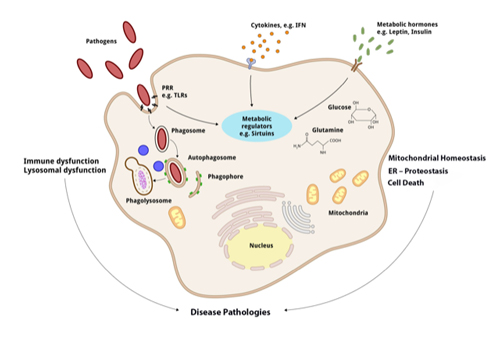Research Program Overview
 Cells are constantly exposed to several internal (metabolites, damaged macromolecules such as proteins and lipids) and external stimuli (e.g. microbes, radiations, temperature and chemicals) which stress the cells. A successful survival of an organism depends on how well it adapts to different stress. Cells survive these insults by mounting specific repair mechanisms such as oxidative stress response, unfolded protein response (UPR), and DNA damage response (DDR) which aid in regaining normal physiology. When they fail to restore homeostasis, they undergo cell death or they survive in a maladaptive phase resulting in pathologies such as malignancies, neurodegenerative, cardiovascular, and metabolic disorders. In our lab we investigate the function of these stress responses in innate immune defences, in the context of pathologies such as cancer and infection which will help in understanding disease pathogenesis and present novel targets for therapeutic treatments.
Cells are constantly exposed to several internal (metabolites, damaged macromolecules such as proteins and lipids) and external stimuli (e.g. microbes, radiations, temperature and chemicals) which stress the cells. A successful survival of an organism depends on how well it adapts to different stress. Cells survive these insults by mounting specific repair mechanisms such as oxidative stress response, unfolded protein response (UPR), and DNA damage response (DDR) which aid in regaining normal physiology. When they fail to restore homeostasis, they undergo cell death or they survive in a maladaptive phase resulting in pathologies such as malignancies, neurodegenerative, cardiovascular, and metabolic disorders. In our lab we investigate the function of these stress responses in innate immune defences, in the context of pathologies such as cancer and infection which will help in understanding disease pathogenesis and present novel targets for therapeutic treatments.
Current Research Projects
- Understanding how metabolism regulates innate immunity
- Cell death mechanisms in infection and cancer
- Organellar (Mitochondria and Endoplasmic Reticulum) stress responses in cancer and immunity
- Host-directed approaches to treat antibiotic-resistant microbes
Laboratory staff

Laboratory head
Select Recent Publications
- Chipurupalli S, Ganesan R, Martini G, Mele L, Reggio A, Esposito M, Kannan E, Namasivayam V, Grumati P, Desiderio V, Robinson N. Cancer cells adapt FAM134B/BiP mediated ER-phagy to survive hypoxic stress. Cell Death and Disease 13(4):357, 2022.
- Lewis AC, Pope VS, Tea MN, Li M, Nwosu GO, Nguyen TM, Wallington-Beddoe CT, Moretti PAB, Anderson D, Creek DJ, Costabile M, Ali SR, Thompson-Peach CAL, Dredge BK, Bert AG, Goodall GJ, Ekert PG, Brown AL, D'Andrea R, Robinson N, Pitman MR, Thomas D, Ross DM, Gliddon BL, Powell JA, Pitson SM. Ceramide-induced integrated stress response overcomes Bcl-2 inhibitor resistance in acute myeloid leukemia. Blood 139(26):3737-3751, 2022.
- Bassal MA, Samaraweera SE, Lim K, Benard BA, Bailey S, Kaur S, Leo P, Toubia J, Thompson-Peach C, Nguyen T, Maung KZY, Casolari DA, Iarossi DG, Pagani IS, Powell J, Pitson S, Natera S, Roessner U, Lewis ID, Brown AL, Tenen DG, Robinson N, Ross DM, Majeti R, Gonda TJ, Thomas D, D'Andrea RJ. Germline mutations in mitochondrial complex I reveal genetic and targetable vulnerability in IDH1-mutant acute myeloid leukaemia. Nat Commun. 12;13(1):2614, 2022.
- Gutiérrez S, Fischer J, Ganesan R, Hos NJ, Cildir G, Wolke M, Pessia A, Frommolt P, Desiderio V, Velagapudi V, Robinson N. Salmonella Typhimurium impairs glycolysis-mediated acidification of phagosomes to evade macrophage defense. PLoS Pathog. 17(9): e1009943, 2021.
- Hos NJ, Fischer J, Hos D, Hejazi Z, Calabrese C, Ganesan R, Murthy AMV, Rybniker J, Kumar S, Krönke M, Robinson N. TRIM21 Is Targeted for Chaperone-Mediated Autophagy during Salmonella Typhimurium Infection. J Immunol. Nov 1;205(9):2456-2467, 2020.
- Kew C, Huang W, Fischer J, Ganesan R, Robinson N*, Antebi A*. Evolutionarily conserved regulation of immunity by the splicing factor RNP-6/PUF60. Elife. Jun 15;9:e57591, 2020. *Equal Senior Author.
- Cildir G, Toubia J, Yip KH, Zhou M, Pant H, Hissaria P, Zhang J, Hong W, Robinson N, Grimbaldeston MA, Lopez AF, Tergaonkar V. Genome-wide Analyses of Chromatin State in Human Mast Cells Reveal Molecular Drivers and Mediators of Allergic and Inflammatory Diseases. Immunity. Nov 19;51(5):949-965.e6, 2019.
- Fischer J, Gutièrrez S, Ganesan R, Calabrese C, Ranjan R, Cildir G, Hos NJ, Rybniker J, Wolke M, Fries JWU, Tergaonkar V, Plum G, Antebi A, Robinson N. Leptin signaling impairs macrophage defences against Salmonella Typhimurium. Proc Natl Acad Sci U S A. Aug 13; 116(33): 16551-16560, 2019.
- Tiku V, Kew C, Mehrotra P, Ganesan R, Robinson N*, Antebi A*. Nucleolar fibrillarin is an evolutionarily conserved regulator of bacterial pathogen resistance. Nat Commun. Sep 6;9(1):3607, 2018. *Equal Senior Author.
- Hos N, Ganesan R, Gutierrez S, Klimek J, Abdullah Z, Krönke M and Robinson N. Type I interferon enhances necroptosis of Salmonella Typhimurium-infected macrophages by impairing anti-oxidative stress responses. J Cell Biol. Dec 4;216(12):4107-4121, 2017.
- Ganesan R, Hos NJ, Gutierrez S, Fischer J, Stepek JM, Daglidu E, Krönke M, Robinson N. Salmonella Typhimurium disrupts Sirt1/AMPK checkpoint control of mTOR to impair autophagy. PLoS Pathog. Feb 13;13(2):e1006227, 2017.
- Robinson N, McComb S, Mulligan R, Dudani R, Krishnan L, Sad S. Type-I interferon induces necroptosis in macrophages during Salmonella Typhimurium infection. Nat Immunol. Oct; 13(10):954-62, 2012.





